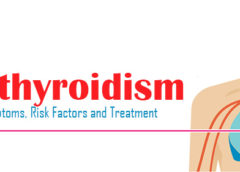Overview
Hypothyroidism is a disorder in which your thyroid gland doesn’t produce enough of essential hormones. Early stages of Hypothyroidism may not result in visible symptoms. Untreated hypothyroidism can cause in health issue, including obesity, joint pain, infertility, heart disease.
Symptoms
Symptoms of hypothyroidism vary, depending on how severe the hormone deficiency is. Problems tend to grow gradually, often over a number of years.
At first, the symptoms of hypothyroidism such as exhaustion and obesity can be barely observed. Or you can simply attribute them to ageing. But as your metabolism continues to slow, you may develop more-obvious issues.
Symptoms of Hypothyroidism can include:
- Exhaustion
- Excessed sensitivity to cold
- Constipation
- Dry skin
- Obesity
- Puffy face
- Hoarseness
- Muscle weakness
- High blood cholesterol
- Muscle pains, tenderness and stiffness
- Pain, stiffness or swelling in the joints
- Heavier than the usual or irregular menstrual cycle
- Thinning hair
- Slow heart rate
- Depression
- Memory loss
- Larger thyroid gland
Hypothyroidism in babies
Though hypothyroidism most commonly affects middle-aged and older people, anyone, including infants, may develop the disorder. Initially, Babies born without a thyroid gland or with a gland not functioning properly can have few signs and symptoms. When neonates have hypothyroidism problems, the problems can include:
- Broad, protruding tongue.
- Problems in breathing.
- Hoarse crying.
- An umbilical hernia.
Infants are likely to have difficulty eating as the disease progresses, so they may struggle to grow and develop normally. They may as well have:
- Constipation
- Weak Muscle Tone
- Excessive Sleepiness
If infants with hypothyroidism are not treated, even mild cases can cause serious physical and mental retardation.
Hypothyroidism in children and teens
Children and teens that develop hypothyroidism usually have the same signs and symptoms as adults, but may also experience:
- Slow growth, resulting in short stature
- Delayed development of permanent teeth
- Delayed puberty
- Poor mental development
When to see a doctor
When you feel sleepy or tired for no reason, see your doctor, or have any of the other signs or symptoms of hypothyroidism, such as dry skin, a swollen, puffy face, constipation, or a hoarse voice.
When you are being treated for hypothyroidism with hormone therapy, schedule follow-up appointments as often as your doctor suggests. Initially, it is important to ensure you get the right dosage of medication. And over time, the dose you need may change.
Causes
When your thyroid doesn’t produce enough hormones, the balance of chemical reactions in your body can be upset. There can be a number of causes, including autoimmune disease, hyperthyroidism treatments, radiation therapy, thyroid surgery and certain medications.
If your thyroid does not generate enough hormones, it can disrupt your body’s balance of chemical reactions. There can be a variety of causes, including autoimmune disease, therapies for hyperthyroidism, radiation therapy, thyroid surgery and other drugs.
The hypothyroidism occurs when enough hormones are not released by the thyroid gland. Hypothyroidism can be caused by multiple causes, including:
• Autoimmune disease. An autoimmune condition known as Hashimoto’s thyroiditis is the most common cause of hypothyroidism. When the immune system develops antibodies that target your own tissues, autoimmune disorders occur. Sometimes this process involves your thyroid gland.
• Thyroid surgery. Removing all or a large portion of your thyroid gland can reduce or halt the development of hormones. You will need to take thyroid hormone for life in that situation.
• Radiation therapy. Radiation used to treat cancers of the head and neck can damage your thyroid gland and may result in hypothyroidism.
• Medications. Hypothyroidism can be treated with a variety of medications. Lithium is one such medication, which is used to treat many psychiatric disorders. Tell your doctor about its effect on your thyroid gland if you’re taking medicines.
Risk factors
Although everyone can develop hypothyroidism, you’re at high risk if you:
- Older than 65
- Have a family history of thyroid disease
- Have an autoimmune disease, such as type 1 diabetes or celiac disease
- Have been treated with radioactive iodine or anti-thyroid medications
- Received radiation to your neck or upper chest
- Have had thyroid surgery
- Have been pregnant or delivered a baby within the past six months
Complications
Untreated hypothyroidism can cause various health issues:
- Goiter: Constant thyroid stimulation to release more hormones will cause the gland to grow bigger — a condition known as a goiter. Although not painful general, a big goiter may affect your appearance and can interfere with swallowing or breathing.
- Heart problems: Hypothyroidism may also be associated with a high risk of cardiac disease and heart failure, mainly because high levels of low-density lipoprotein (LDL) cholesterol — the “poor” cholesterol — may occur in people with an underactive thyroid.
- Mental health issues: Depression may begin early in hypothyroidism and may become more serious over time. Also, Hypothyroidism can cause slow mental functioning.
- Myxedema: This unusual, life-threatening condition is the result of undiagnosed long-term hypothyroidism. The symptoms include intense cold intolerance and drowsiness followed by profound lethargy and unconsciousness. Sedatives, infection or other trauma to your body may cause a myxedema coma. When you have myxedema signs or symptoms you need urgent medical emergency care.
- Infertility: Low levels of thyroid hormone may interfere with ovulation, which impairs fertility. Additionally, some of the causes of hypothyroidism — including autoimmune disorder — may also impair fertility.
- Birth defects: Babies born to untreated women with thyroid disease can have a higher chance of birth defects than babies born to healthy mothers. Such babies are more likely to face severe academic and behavioural problems.
Babies with untreated hypothyroidism present at birth are at risk of severe physical mental development disorders both. But if this condition is diagnosed within the first few months of life, then there are excellent chances of normal development.

Leave a Reply
You must be logged in to post a comment.